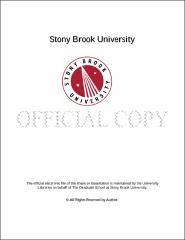| dc.identifier.uri | http://hdl.handle.net/11401/76819 | |
| dc.description.sponsorship | This work is sponsored by the Stony Brook University Graduate School in compliance with the requirements for completion of degree. | en_US |
| dc.format | Monograph | |
| dc.format.medium | Electronic Resource | en_US |
| dc.language.iso | en_US | |
| dc.publisher | The Graduate School, Stony Brook University: Stony Brook, NY. | |
| dc.type | Dissertation | |
| dcterms.abstract | A vast amount of evidence exists showing a relationship between socioeconomic status (SES) and health. Regardless of how outcomes are measured (self-reported health, incidence of disease, mortality rates and others), income, educational attainment, and occupation are key predictors. How SES matters for health outcomes has been a major question asked by researchers during the past 25 years. Many sociologists argue that the resources that come along with high socioeconomic status - money, power, prestige, beneficial social connections, knowledge, and skills - explains the SES/health gradient. This research project assesses whether or not those resources were important to individuals in dealing with a chronic illness, specifically end-stage renal disease (ESRD) undergoing hemodialysis. A mixed-method design was used to determine if the resources mentioned were factors in making individuals good dialysis patients. A survey questionnaire was distributed to hemodialysis patients (N=82) to assess relationships between measures of socioeconomic status, resources, and patient adherence. Semi-structured interviews (N=17) were conducted based on findings from the statistical analysis. Observational data of hemodialysis treatment was also gathered and reported. Although statistically significant relationships were found between measures of SES (father's education, individual's occupation) and patient adherence in the quantitative analysis, little evidence was found that resources explained the links between SES and adherence. In interviews, father's education mattered to patients because it provided a source of enrichment and stability for them that translated into a self-efficacious and positive attitude towards one's health. Further, having a clearly defined occupation from which patients drew upon as a source of identity buffered these individuals from having their illness define them. Respondents who did not have stable environments and meaningful careers felt trapped and defined by their illness, and struggled with many aspects of their treatment. | |
| dcterms.available | 2017-09-20T16:51:14Z | |
| dcterms.contributor | Feldman, Kenneth | en_US |
| dcterms.contributor | Tyree, Andrea | en_US |
| dcterms.contributor | Marrone, Catherine | en_US |
| dcterms.contributor | Zussman, Robert. | en_US |
| dcterms.creator | Bugyi, Paul Eric | |
| dcterms.dateAccepted | 2017-09-20T16:51:14Z | |
| dcterms.dateSubmitted | 2017-09-20T16:51:14Z | |
| dcterms.description | Department of Sociology. | en_US |
| dcterms.extent | 140 pg. | en_US |
| dcterms.format | Monograph | |
| dcterms.format | Application/PDF | en_US |
| dcterms.identifier | http://hdl.handle.net/11401/76819 | |
| dcterms.issued | 2014-12-01 | |
| dcterms.language | en_US | |
| dcterms.provenance | Made available in DSpace on 2017-09-20T16:51:14Z (GMT). No. of bitstreams: 1
Bugyi_grad.sunysb_0771E_11850.pdf: 1444129 bytes, checksum: b6041e9619993946718e82783e4c7c27 (MD5)
Previous issue date: 1 | en |
| dcterms.publisher | The Graduate School, Stony Brook University: Stony Brook, NY. | |
| dcterms.subject | Adherence, Family Background, Health Disparities, Hemodialysis, Social Class | |
| dcterms.subject | Sociology | |
| dcterms.title | Family Education, Occupation, and Chronic Illness: Social Class and the Lives of Hemodialysis Patients | |
| dcterms.type | Dissertation | |

